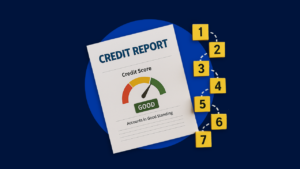Solutions for identity theft victims during the government shutdown

Imagine the following scenario. You apply for a new loan or credit card, only to have your application denied. Surprised, you check your three credit reports and discover some disturbing information. Your reports are filled with records of credit inquiries and derogatory accounts you don’t recognize. Your identity has been stolen.
If you look at standard advice on how to report identity theft, you’re likely to be directed to the Federal Trade Commission’s website, IdentityTheft.gov. The site is normally full of one-stop resources designed to help consumers both report and recover from identity theft.
There’s only one problem: IdentityTheft.gov is not operational during the government shutdown.
If you visit the website, you’ll find the following message:
“Due to the government shutdown, we are unable to offer this website service at this time. Information about identity theft can be found on the FTC’s website at: Identity Theft | Consumer Information. We will resume normal operations when the government is funded.”
You can still report identity theft
Over the past four weeks, the message above has left many victims feeling angry or panicked. However, the news for consumers with freshly stolen identities isn’t all bad. Though IdentityTheft.gov may not be operational now, you can still report identity theft during the government shutdown.
Here are some tips that may help.
You can file a police report to document the crime
If you discover fraudulent accounts, make a detailed list of the items on your credit reports that don’t belong to you. Your next step will be to file a police report to document the crime. (Note, when the government is operational you can visit IdentityTheft.gov to complete an “Identity Theft Report” online instead of visiting your local police station.)
Once you’re armed with your official report documenting the crime, you should send it to each of the three credit reporting agencies, along with a list of all the fraudulent information which needs to be blocked from your credit reports. Your police report or Identity Theft Report are typically considered enough evidence to clear your credit reports of accounts which you believe do not belong to you.
Once your report has been accepted, the CRAs have four business days to remove and block any information on your credit reports which is the result of identity theft.
Credit reporting agencies are not part of the government
Despite a common credit myth, the credit reporting agencies — Equifax, TransUnion, and Experian — are not owned by the government. They are, however, regulated by federal law.The Fair Credit Reporting Act (FCRA) is the chief federal law which governs how the credit reporting agencies (CRAs) must handle the information on your credit reports. Among other rules, the FCRA sets certain responsibilities that the CRAs must fulfill whenever you report suspected or actual identity theft.
The shutdown has not affected these responsibilities. If an identity theft victim contacts a CRA for help, it still has to take action.
You can place free fraud alerts on your credit reports
The FCRA affords considerable rights to help victims of identity theft recover from the crime. One of the first things you may want to do if you suspect you are a victim of ID theft is to contact one of the CRAs and ask for free fraud alerts to be placed on your credit reports.
Initial fraud alerts are free of charge and will now remain on your credit reports for one year, thanks to new federal law which amended the FCRA last year. These alerts are known as “one call” alerts due to the fact you only need to contact one CRA to make your request. For example, if you contact TransUnion to place fraud alert on your credit report, TransUnion is responsible for notifying Equifax and Experian so that they can follow suit.
Once fraud alerts have been added to your credit reports, it lets future lenders know they should be cautious before issuing any new credit in your name. The lender must take steps to verify your identity (such as calling you on the phone) before approving any new credit applications, issuing additional credit cards, or increasing your credit limit on an existing account.
A fraud alert is an effective way to deter criminals who have gotten their hands on your personal information. However, fraud alerts aren’t foolproof. If you are looking for a stronger way to protect your credit reports, you might want to consider adding credit freezes as well.
You can freeze your credit reports for no charge
The same federal law which extended fraud alerts to 12 months has also made it possible for you to freeze your three credit reports free of charge. (Previously, there was a chance you might have been charged a small fee for the service.) A credit freeze blocks access to your credit file so that no new lender can obtain a copy of your information. If you ever want to apply for legitimate credit yourself in the future, you’ll first need to contact the credit bureaus and thaw your reports using your personalized PIN numbers.
Here’s how a credit freeze works. A thief applies for new credit in your name, but because your reports are frozen, the lender cannot access your credit information. As a result, the phony application for credit would be turned down on the spot. It’s like your credit reports are locked inside of a vault and only you, your current creditors, and the CRAs have the combination.
Unlike fraud alerts, you will need to contact each of the three credit reporting agencies individually if you wish to place a security freeze on your credit reports.
Whether you choose a fraud alert, a credit freeze or both, here is the contact information you will need to make the request(s):
-
Equifax
800-685-1111 -
TransUnion
888-909-8872 -
Experian
888-397-3742
As you can see, victims of identity theft still have plenty of options and protections in place, even amid the government shutdown. Filing a police report at your local law enforcement office may not be the most convenient way to report identity theft, but it is nonetheless effective. And, until the federal government is back up and running again at full capacity, it’s probably the best option available.
Learn more:
- A 12-point checklist for victims of identity theft
- How the government shutdown could impact tax refunds
- Government shutdown: Resources for federal workers who can’t make mortgage or rent
- Thinking about filing for unemployment during the government shutdown? Read this first
Why we ask for feedback Your feedback helps us improve our content and services. It takes less than a minute to complete.
Your responses are anonymous and will only be used for improving our website.






